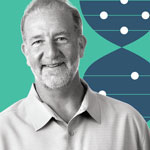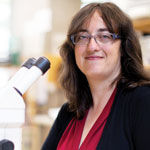Deaths from colorectal cancer in people under 55 are increasing. A new study led by Professor Ronald Evans, with first author Ting Fu and collaborators, suggests that high-fat diets fuel colorectal cancer growth by upsetting the balance of bile acids in the intestine and triggering a hormonal signal that lets cancerous cells thrive. The findings could explain why colorectal cancer is being seen in younger people growing up at a time when high-fat diets are common.
Cancer
New role for a driver of metastatic cancers
Metastatic cancers are notoriously difficult to treat and often deadly. Professor Katherine Jones, first author Seung Choi and colleagues revealed a new role for a protein called CDK12. By analyzing the role of CDK12 in protecting cells from chemotherapy, the team discovered a new group of genes that controls cancer-cell metabolism. CDK12 works with another protein, mTORC1, to control the process of translation—an important step in creating a new protein within the cell. This finding points to a potential new metastatic drug target.
Read News ReleaseNew study targets achilles’ heel of pancreatic cancer
Advanced pancreatic cancer is often symptomless, leading to late diagnosis after metastases have spread throughout the body. Additionally, tumor cells are encased in a protective shield, a microenvironment conferring resistance to many cancer drugs. Professor Tony Hunter, first author Yu Shi and an international team of collaborators uncovered the role of a signaling protein, LIF, that may be a useful biomarker to help diagnose pancreatic cancer more quickly and efficiently than current screenings methods.
Featured Stories
 Kay Tye – Breaking down the brainKay Tye, the newest addition to Salk’s faculty, is a burst of energy who can chat about everything from the mysteries of the brain to the intricacies of a breakdance move. In this Q&A, she discusses her roundabout journey to science, her passion for mentorship and her love of life outside the lab.
Kay Tye – Breaking down the brainKay Tye, the newest addition to Salk’s faculty, is a burst of energy who can chat about everything from the mysteries of the brain to the intricacies of a breakdance move. In this Q&A, she discusses her roundabout journey to science, her passion for mentorship and her love of life outside the lab. How to stop a killerPancreatic cancer is one of the most difficult cancers to detect and treat, in part because of an impenetrable "shield" that forms around the tumor. Salk scientists, many of whom have a personal connection to cancer, are leading the charge in new approaches to tackle this deadly disease.
How to stop a killerPancreatic cancer is one of the most difficult cancers to detect and treat, in part because of an impenetrable "shield" that forms around the tumor. Salk scientists, many of whom have a personal connection to cancer, are leading the charge in new approaches to tackle this deadly disease. Travis Berggren – Working at the intersection of biology and technologySenior Staff Scientist Travis Berggren shares his path to Salk and his perspective on how advances in technology facilitate world-changing discoveries in genetics, neuroscience, cancer, immunology, plant biology and other areas.
Travis Berggren – Working at the intersection of biology and technologySenior Staff Scientist Travis Berggren shares his path to Salk and his perspective on how advances in technology facilitate world-changing discoveries in genetics, neuroscience, cancer, immunology, plant biology and other areas. Graziana GattoPostdoctoral Fellow Graziana Gatto comes to Salk from Italy, bringing her passion for scientific outreach and keen insights into how various sensations-like pain, itching or touch-are processed by the brain.
Graziana GattoPostdoctoral Fellow Graziana Gatto comes to Salk from Italy, bringing her passion for scientific outreach and keen insights into how various sensations-like pain, itching or touch-are processed by the brain.






















































